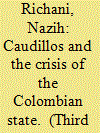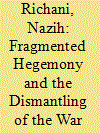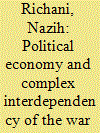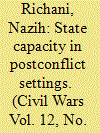| Srl | Item |
| 1 |
ID:
078962


|
|
|
|
|
| Publication |
2007.
|
| Summary/Abstract |
This article examines the rise of private militias within the historical context of the crisis of the Colombian nation-state. Taking a political economy approach, the paper attempts to assess the consequences of the emergence of the United Auto Defenses of Colombia (auc) for the country's political trajectory. It argues that the auc and the narco-bourgeoisie have created a new 'reactionary class configuration' that has regenerated a 'labour-repressive' mode of capital accumulation best characterised as a rentier-based political economy. Hence the counterinsurgency in Colombia is not the typical military instrument of the state, but rather an instrument for class articulation and socioeconomic and political transformation beyond the state. Although these transformations were consistent with the neoliberal economic path that the Colombian government had adopted in earnest by the late 1980s, they also deepened the political crisis of the state and accentuated 'fragmented sovereignty' and the 'war system'. Finally, this article sheds light on the social class composition of the auc and on the insurgency led by the Fuerzas Armadas Revolucionarias de Colombia (farc), revealing the social class differences between the two main warring actors.
|
|
|
|
|
|
|
|
|
|
|
|
|
|
|
|
| 2 |
ID:
172052


|
|
|
|
|
| Summary/Abstract |
Establishing peace in Colombia has been an enigma escaping the best intentions of some presidents. The causes of this riddle are multiple. Some attributed it to the nature of the state-making process led by a fractured elite compounded with the state limited resources in a country with one of the most complex topographies in the world. This article tackles part of this puzzle, particularly the inability of any fraction of the elite to establish its hegemonic vision over the others and hence to pacify the polity. It explores why previous presidents who attempted to find a peaceful settlement of its long armed conflict failed and why and how did President Juan Manuel Santos succeed. Against the backdrop of a fragmented hegemony, I analyze two core areas that have received scant attention in the literature, which are essential to understand the previous failures. The role of the United States in the Colombian conflict and the excessive autonomy of Colombia military institution vis-à-vis the executive in conducting the war.
|
|
|
|
|
|
|
|
|
|
|
|
|
|
|
|
| 3 |
ID:
145028


|
|
|
|
|
| Summary/Abstract |
Duration of civil wars has been an elusive area of study particularly because of the tedious task of disentangling the interplay of actors’ agencies, incentives' structures and constraints. This article tackles Syria’s civil war that has completed its fifth year with little hope for an end any time soon. I examine a plausible cause leading to its protraction. Namely the formation of a war system, which made the costs of war less than the expected risks of peace giving the local, regional and international actors that are shouldering the costs. The war system approach combines class analysis with system-structural analysis capturing nuances and dynamics of conflict. This article is based in part based on primary sources collected by author in the Summers of 2014 and 2015 in Lebanon.
|
|
|
|
|
|
|
|
|
|
|
|
|
|
|
|
| 4 |
ID:
101344


|
|
|
|
|
| Publication |
2010.
|
| Summary/Abstract |
This article proposes a systemic approach to explore the determinants of homicides. This approach examines two interrelated factors: a) the interplay between state capacities and the opportunity costs of crime; and b) consequently, the political economy of this interplay. In this article I argue that weakened state capacities in the postconflict period in El Salvador and Guatemala have helped in the creation of a systemic relationship interlocking states' agents and criminal organizations in a modality that perpetuates high rates of homicides. My purpose in this article is to discern core elements of this systemic relationship, its dynamics, and political economy and to answer: what is maintaining the system?
|
|
|
|
|
|
|
|
|
|
|
|
|
|
|
|